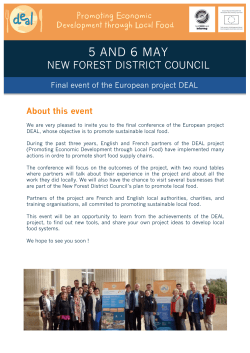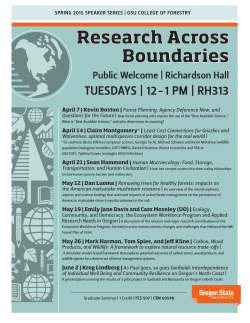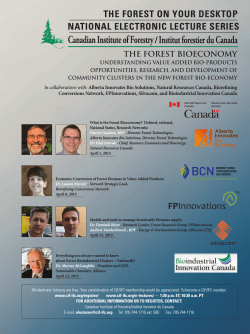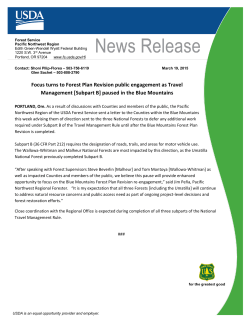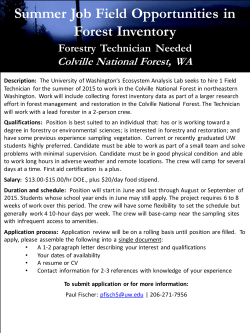
US Forest Products Lab Steadily Moves Industry Forward
US Forest Products Lab Steadily Moves Industry Forward For over 100 years, USDA Forest Service’s Forest Products Laboratory (FPL) in Madison, Wisconsin has been conducting research. Today it is a rich knowledge center with experts from biomass to baseball bats – anything made from wood. Much of its work has advanced the pulp, paper and forest products industry’s manufacturing efficiency, environmental and forest stewardship, product quality and in turn, supports U.S. national priorities. Since much of FPL’s research is funded by the U.S. government, research findings are readily available to the public. Paper360° recently paid a visit during their annual Industrial Liaison Committee Meeting held in conjunction with TAPPI and the Agenda 2020 Technology Alliance. For decades FPL has annually hosted the meeting to get feedback and recalibrate its priorities. “The annual meeting helps FPL focus its research, development and deployment activities to best meet both industry and national priorities,” notes Dr. Ted Wegner, Assistant Director, USDA Forest Service Forest Products Laboratory At the meeting, FPL reported on some of their most significant projects and listened to the industry’s recommendations for future research. R&D Leaders from International Paper, Verso, Kapstone, NewPage, Georgia-Pacific, Ashland, Nalco and several universities were present. FPL Research is Important to Paper Companies Most of FPL’s research is in non-traditional areas where paper producers and suppliers are not spending R&D resources. Due to cost containment pressures and competition, U.S. companies often dedicate limited R&D resources towards quick payback, easily commercialized projects instead of longer term, more risky research that could possibly result in game-changing innovations. FPL projects are exploring the fundamentals and scale-up issues in high potential areas like bioenergy, bioproducts, nanotechnology, advanced structures, advanced composites and healthier and more sustainable forests. “The Forest Products Lab helps keep U.S. forest products companies competitive with those in China, Canada, Finland, Sweden and other countries, where there is high levels of government investment in the industry”, says Gopal Goyal, Chief Scientist, International Paper. Goyal and the other attendees recommended that future research priorities should be better aligned with those endorsed by the Agenda 2020 Technology Alliance. (Agenda 2020 is a partnership of member companies who work to transform the paper and forest products industry through innovation in its manufacturing processes and products and priority R&D needs). These include: Next-generation chemical pulping Energy-efficient black liquor concentration Reuse of process water Drier web to paper machine dryers Cellulosic nanomaterials Value-added bioproducts from pulp mills FPL is doing research in several of these areas, especially in bioproducts and nanotechnology which will be described in detail later. Hit List of Innovations Over the years, the Forest Products Lab research has led to many innovations that have moved the pulp, paper and forestry industries forward. FPL has supported many refinements to the kraft pulping process and is now looking into the use of catalysts to further lower the cost. FPL’s pulping innovations have become some of the dominant processes used in the United States today. FPL researchers helped develop the “lickless” stamp, and then refined the recycling process to prevent the pressure sensitive adhesives from gumming up recycling equipment. Research is also underway to develop new composite materials that blend wood fiber with plastics. This technology allows the recycling of waste wood and waste paper into value-added products. Much of the work was done in the FPL pilot plant in Madison, with capabilities in recycling and deinking, TMP/CTMP production. FPL researchers frequently speak at TAPPI conferences and publish their work in peer-reviewed journals like TAPPI Journal and other publications. Wood based biorefining has been an active research area at the FPL since the 1930’s. The Madison Process, a variant of the well-known Scholler process, was implemented by the Department of Defense and Vulcan Copper and Supply Company in a full-scale plant for producing butadiene during World War II. Recent biorefinery activities at FPL have focused on chemical pretreatments for enzyme conversion of woody biomass. The focus is on small diameter trees and other woody biomass that is not suitable for traditional forest products. The pines are notoriously difficult to hydrolyze with enzymes and to overcome this resistance, the lab has developed a sulfite based pretreatment process – SPORL (Sulfite Pretreatment to Overcome the Recalcitrance of Lignocelluloses) – somewhat similar to sulfite pulping. Nanotechnology Focus Much of the US Forest Product Laboratory’s current research focuses on the emerging nanotechnology area, where the vast forests of North America could provide super strong materials for packaging, construction or autos, replacing plastics, steel, and other non-renewable materials. Indeed, nanocellulose-based products could eventually consume some of the North American wood fiber previously used for communication papers now being displaced by electronic media. The FPL started a wood-based nanotechnology research program in 2006. In 2007, the Forest Service joined the National Nanotechnology Initiative (NNI), a collaboration of 26 federal agencies. It was soon recognized that research progress was being hindered by a lack of repeatable quantities of wood-derived CNCs and CNFs. In 2010, the Forest Service funded construction of a $1.7 million facility at the FPL to provide CNCs and the TEMPO-oxidized CNF variant.7 The FPL facility produces 25-kg batches of CNCs and 2-kg batches of CNFs. In 2011, the Forest Service provided an additional $1.5 million for facilities at the University of Maine for other grades of CNF. FPL CNS may now be purchased from the University of Maine. Much of FPL’s work in nanotechnology has been presented at TAPPI’s Nanotechnology Conference and published in TAPPI Journal. Commercialization Path for Nano Independent laboratories around the world have demonstrated that wood derived nanomaterials will likely become viable commercial products. Continued work on applications is critical—larger scale applications must be successfully demonstrated to provide incentive for large private sector investments. The largest volume uses will likely be for reinforcing composites, films, and coatings. In these higher volume uses, price is important. To move commercialization forward, the Forest Service works in formal and informal partnerships with a U.S.-based consortium of the paper industry, the National Nanotechnology Initiative, other Federal agencies/departments, U.S. Endowment for Forestry and Communities and internationally with counterpart institutions in Canada and Finland. “The US cannot maintain healthy, diverse, productive and sustainable forests without an equally healthy, diverse, productive and competitive forest products industry. The FPL is an integral component of the mechanism that drives success for the forest products industry.” - Jim Bradbury, NewPage Pulping Research Manager. Political and Budget Challenges Loom The FPL operates through a combination of U.S. government funding and non-public funding (when collaborating with manufacturers and other research organizations). U.S. federal budget watchers are constantly looking for new ways to reduce deficits and fund new politically popular priorities. As a result, the US Forest Service and Forest Products Lab undergo ongoing funding scrutiny. In FY 2015, the US President’s proposed budget for FPL is 18,926,000 USD, a 12% decrease over 2014. If approved, the decreased funding will effectively halt research on t biomass utilization that help accelerate forest restoration through the development of higher value, high volume markets for low value hazardous fuels. The reductions will also reduce product development and design research along with use of green building materials in commercial construction. The reduced funding could also delay important research in cellulosic nanomaterials, including projects to overcome the key technical barriers for cost-effective production and use. The reduced funding will also restrict the ability of the FPL to contribute to a public-private partnership established in FY 2013 with the U.S. Endowment for Forestry and Communities to rapidly advance commercialization of nanocellulose in the US. “While it’s inherently obvious that the U.S. federal budget needs to be managed very carefully and Congress must make difficult choices, I am extremely concerned about the funding challenges that FPL is facing every year now. FPL is the only federal laboratory in the U.S. with research responsibility for keeping our forests healthy and more resilient through viable markets for forest products. FPL helps keep American forests healthy and American businesses competitive. The U.S. needs to keep FPL funding strong and committed so they can focus nationally significant research that keeps America strong!” - Sean Ireland, Manager, New Technologies and Market Ventures, Verso Paper. Over the years, the US Forest Products Laboratory has steadily moved the industry forward. Only through strong funding and guidance from the Annual Industrial Liaison Committee will FPL be able continue its record of confronting the scientific frontiers of the forest products industry.
© Copyright 2025

